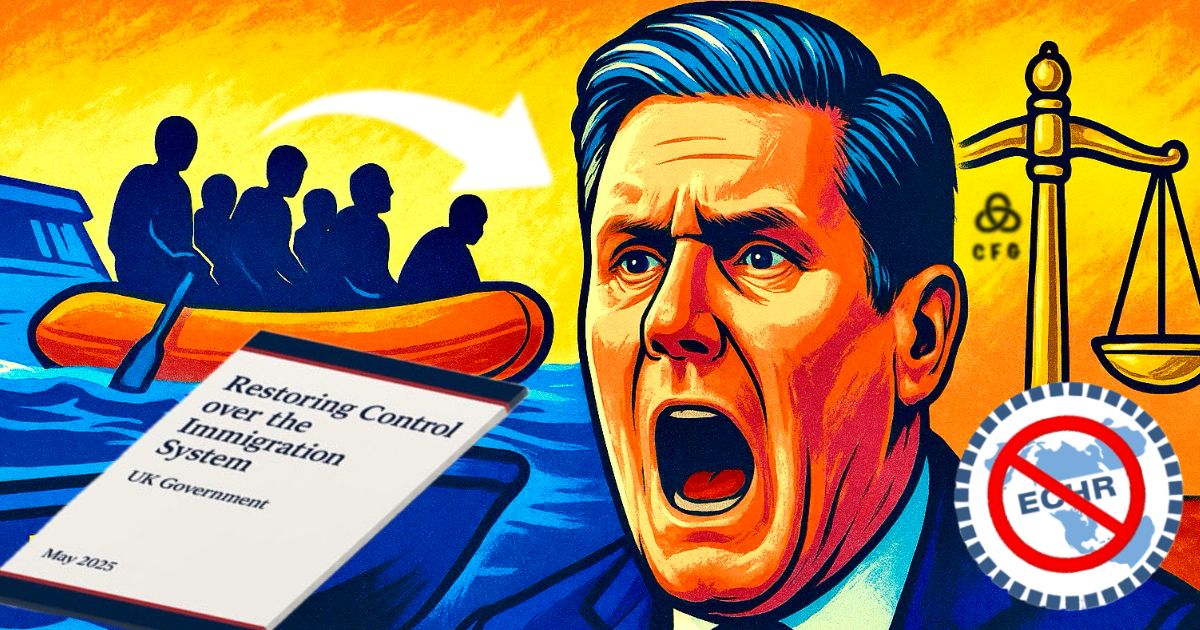HUMAN RIGHTS LAWYER PM BLOCKED… BY HUMAN RIGHTS LAW
Starmer’s migrant returns plan collapses in court as judges use human rights laws he once championed to block deportations before a single flight takes off.
It is not every day that a Prime Minister is defeated in open court by the very legal doctrine he once championed, but Sir Keir Starmer has managed that rare feat. His flagship “one-in, one-out” migrant returns scheme, trumpeted as the sober and pragmatic alternative to the Rwanda policy, is already unravelling after a single High Court ruling.
The irony is almost too perfect: a Prime Minister who made his name editing manuals on how to weaponise the Human Rights Act has now discovered, to his cost, that those very rights can weaponise themselves against him.
The first test case was hardly earth-shattering. A 25-year-old Eritrean who arrived on a small boat in August was scheduled for removal to France, a country Starmer himself insisted was “safe” and ready to take returnees. At the last moment, his legal team produced a modern slavery claim and invoked the European Convention on Human Rights.
With that, the High Court blocked the flight. Two further deportations collapsed in similar fashion. The numbers speak for themselves: three challenges, three defeats, zero deportations.
This is not just a legal technicality. It exposes the central flaw in Labour’s entire border strategy. Starmer scrapped Rwanda in favour of a plan that was supposed to deliver swift returns across the Channel. He told the country it would be quicker, cheaper and legally watertight.
Yet within weeks, the courts have shown it to be none of those things. Far from “short order” removals, the policy is now in long-term limbo, trapped in a tangle of Strasbourg jurisprudence and British trafficking law.
The truth is stark: so long as Britain remains bound by the ECHR, no government of any colour can ever guarantee migrant flights will actually leave the tarmac. Ministers can brief, spin and insist otherwise, but judges will continue to intervene. The Strasbourg court has ruled before that destitution in France can amount to:
“inhuman and degrading treatment”.
Now it is being used as a template to halt removals from Britain. If France is not safe enough to receive migrants under human rights law, then nowhere is.
That is why the debate has to move beyond short-term fixes. Modern slavery claims, asylum appeals and Article 3 challenges will not disappear under Labour any more than they did under the Conservatives. The only way to restore legal certainty is for Britain to remove itself from the jurisdiction of Strasbourg altogether.
Leaving the ECHR is not a fringe slogan; it is the unavoidable first step towards reasserting border control. Without it, every policy is destined for the same fate as Starmer’s: a paper exercise shredded by late-night injunctions.
And this is where the irony turns bitter. Starmer the barrister once hailed the Human Rights Act as a “new way of thinking” about the law. He wrote that it had “enormous potential” to reshape Britain’s legal landscape. Now as Prime Minister, he is discovering that potential includes paralysing his own government. In practice, it means that immigration policy is not decided by Cabinet but by counsel in wigs, armed with well-thumbed Strasbourg precedents.
The numbers pouring across the Channel make the urgency impossible to ignore. More than 5,400 arrivals since the returns scheme came into force, and over 31,000 so far this year — a 38 per cent rise on the same period last year. Yet every attempt at removal has been blocked, leaving Labour’s promise of grip in tatters. This is the same Prime Minister who insisted Britain would never leave the human rights treaty. It is now clear that by taking that option off the table, he has left himself boxed in.
In the end, it is the simplest of legal truths. You cannot legislate away Strasbourg, you cannot brief away Strasbourg, and you cannot out-lawyer Strasbourg. Starmer of all people should know this. Until Britain takes the decisive step of walking away from the ECHR, every border policy will be little more than a press release waiting for an injunction. And the cruel joke is that the Prime Minister most uniquely qualified to understand that reality is also the one least willing to confront it.
Well, that’s all for now. But until our next article, please stay tuned, stay informed, but most of all stay safe, and I’ll see you then.





